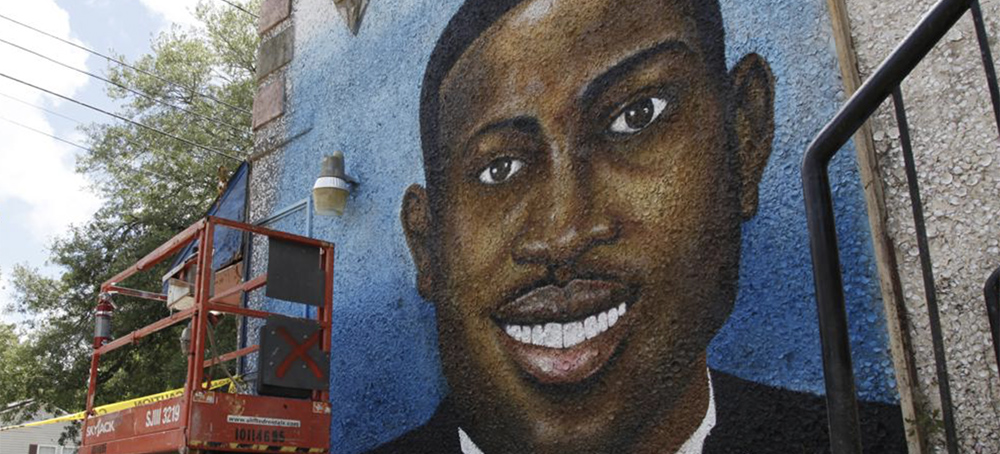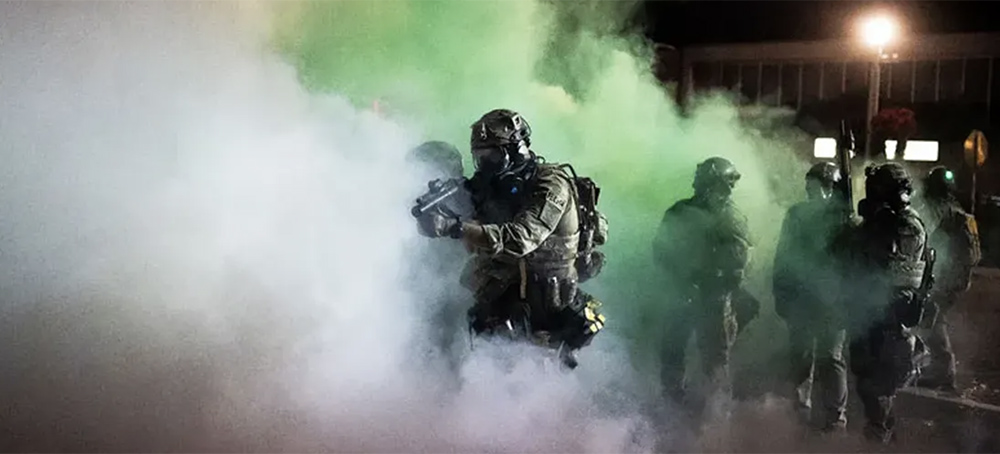Live on the homepage now!
Reader Supported News
Those who celebrate the Rittenhouse verdict don't understand the chaos they've invited — but they crave it
By June 1, 2020, Trump's seeming afterthought about "Second Amendment people" had metastasized into something truly scary. He and combat-fatigues-clad Gen. Mark Milley, chairman of the Joint Chiefs of Staff, along with Attorney General William Barr, strode from the White House to Lafayette Park, where a peaceful demonstration had been dispersed brutally by National Guard troops.
Trump's insistence only days earlier that the U.S. Army itself should be sent against the protesters — a demand echoed by Arkansas Sen. Tom Cotton in a now-infamous New York Times op-ed — reminded me of Julius Caesar leading Roman legions illegally across the river Rubicon from Gaul into Italy in 49 B.C. to subdue Rome's own citizens and, with them, their republic.
Kenosha, Wisconsin's closest approximation to the Rubicon is the tiny Pike River, which flows from Petrifying Springs into Lake Michigan. Its closest approximation to a military crackdown was the police mobilization against violent protests after a police officer shot and paralyzed an unarmed young Black man in August of last year. Those police failed to challenge Kyle Rittenhouse, the illegally armed, 17-year-old "Second Amendment person" who shot three men, killing two of them.
And when a Kenosha County jury failed to convict Rittenhouse on even a misdemeanor, sending what the parents of Anthony Huber — one of the men Rittenhouse killed — characterized as "the unacceptable message that armed civilians can show up in any town, incite violence, and then use the danger they have created to justify shooting people in the street," I couldn't help but wonder what, if anything, will stop armed "Second Amendment people" from showing up near polling places a year from now, as a Republican National Ballot Security Task Force" has done intermittently since 1981, although without brandishing guns.
More unnervingly and urgently, I wonder why a jury of ordinary citizens, along with thousands of others who approved and even celebrated the Rittenhouse verdict are walking themselves across a Rubicon to deliver the message I've just cited, even though they haven't been "demagogued" into doing it by a Caesar or driven to do it by a military force.
New York Times columnist Charles Blow has noted that Rittenhouse was the same age as Trayvon Martin, the unarmed Black youth shot dead in Florida by George Zimmerman, who considered himself a "protector" of his neighborhood and who was acquitted of murder. Blow notes that although Trayvon Martin "was thugified" by Zimmerman and the judicial process, Rittenhouse was "infantilized" by the defense argument that a 17-year-old may be excused for misjudging dangers that he himself has provoked illegally. It's hard to imagine a similar jury accepting similar excuses for a young Black man with an assault rifle, even if he never fired it.
I've contended for years that swift, dark undercurrents are degrading and stupefying Americans in ways that most of us try not to acknowledge. More of us than ever before are normalizing our adaptations to daily variants of force and fraud in the commercial groping and goosing of our private lives and public spaces; in nihilistic entertainment that fetishizes violence without context and sex without attachment; in the "gladiatorialization: and corruption of sports; in home-security precautions against the prospect of armed invasion; in casino-like financing of unproductive economic activities, such as the predatory lending that tricks millions out of their homes; and in a huge, ever-expanding prison industry created to deter or punish the broken, violent victims of all these come-ons, even as schools in the "nicest," "safest," neighborhoods operate in fear of gunmen who, from Columbine to Sandy Hook and beyond, have been students or residents there themselves.
Stressed by this republican derangement, millions are spending billions on palliatives, medications, addictions and even surveillance designed to protect them from themselves. All those vials, syringes, home-security systems and shootings reflect the insinuation of what Edward Gibbon, the historian of ancient Rome, called "a slow and secret poison into the vitals of the empire" until Roman citizens "no longer possessed that public courage which is nourished by the love of independence, the sense of national honour, the presence of danger, and the habit of command. They received laws and governors from the will of their sovereign, and trusted for their defence to a mercenary army."
Is it really so surprising that some of the stressed and dispossessed, too ill to bear their sicknesses or their cures, demand to be lied to instead, with simple but compelling fantasies that direct them toward saviors and scapegoats — into cries for strongmen to cross a Rubicon or two and for "Second Amendment people" to take our streets?
 A painted mural of Ahmaud Arbery is displayed on May 17, 2020, in Brunswick, Ga., where the 25-year-old man was shot and killed in February. Arbery was shot and killed by two men who told police they thought he was a burglar. (photo: Sarah Blake Morgan/AP)
A painted mural of Ahmaud Arbery is displayed on May 17, 2020, in Brunswick, Ga., where the 25-year-old man was shot and killed in February. Arbery was shot and killed by two men who told police they thought he was a burglar. (photo: Sarah Blake Morgan/AP)
The February 2020 slaying drew limited attention at first. But when video of the shooting leaked online, Arbery’s death quickly became another example in the nation’s reckoning of racial injustice in the way Black people are treated in their everyday lives.
Now the men all face a mandatory sentence of life in prison. The judge will decide whether their sentences are served with or without the possibility of parole.
As the first of 23 guilty verdicts were read, Arbery’s father had to leave the courtroom after leaping up and shouting. At the reading of the last criminal count, Arbery’s mother dropped her head and quietly pumped her fists.
“He didn’t do nothing but run and dream,” Marcus Arbery Sr. said of his son. Outside the courthouse, dozens of Black supporters hugged and cried.
The jury deliberated for about 10 hours before convicting Greg McMichael, son Travis McMichael and neighbor William “Roddie” Bryan.
The McMichaels grabbed guns and jumped in a pickup truck to pursue the 25-year-old Arbery after seeing him running outside the Georgia port city of Brunswick. Bryan joined the pursuit in his own pickup and recorded cellphone video of Travis McMichael fatally shooting Arbery.
The father and son told police they suspected Arbery was a fleeing burglar. But the prosecution argued that the men provoked the fatal confrontation and that there was no evidence Arbery committed any crimes in the neighborhood.
“We commend the courage and bravery of this jury to say that what happened on Feb. 23, 2020, to Ahmaud Arbery — the hunting and killing of Ahmaud Arbery — it was not only morally wrong but legally wrong, and we are thankful for that,” said Latonia Hines, Cobb County executive assistant district attorney.
Prosecutor Linda Dunikoski added: “The jury system works in this country. And when you present the truth to people and they see it, they will do the right thing.”
Travis McMichael, 35, stood for the verdict, his lawyer’s arm around his shoulder. At one point, he lowered his head to his chest. After the verdicts were read, as he stood to leave, he mouthed “love you” to his mother in the courtroom gallery.
Greg McMichael, 65, hung his head when the judge read his first guilty verdict. Bryan, 52, bit his lip.
Speaking outside the courthouse, Ben Crump, attorney for Arbery’s father, repeatedly said that “the spirit of Ahmaud defeated the lynch mob.”
Arbery’s mother, Wanda Cooper-Jones, thanked the crowd gathered for the verdict and said she did not think she would see this day.
“It’s been a long fight. It’s been a hard fight. But God is good,” she said, adding that her son would now rest in peace.
Travis McMichaels’ attorneys said both he and his father feel that they did the right thing, and that they believed the video would help their case. But they also said the McMichaels regret that Arbery got killed.
“I can tell you honestly, these men are sorry for what happened to Ahmaud Arbery,” attorney Jason Sheffield said. “They are sorry he’s dead. They are sorry for the tragedy that happened because of the choices they made to go out there and try to stop him.”
They planned to appeal.
Bryan’s attorney, Kevin Gough, said his team was “disappointed with the verdict, but we respect it.” He planned to file new legal motions after Thanksgiving.
Superior Court Judge Timothy Walmsley did not immediately schedule a sentencing date, saying that he wanted to give both sides time to prepare.
In a statement, President Joe Biden said Arbery’s killing was a “devastating reminder” of how much more work the country has to do in the fight for racial justice.
“While the guilty verdicts reflect our justice system doing its job, that alone is not enough. Instead, we must recommit ourselves to building a future of unity and shared strength, where no one fears violence because of the color of their skin,” Biden said.
Though prosecutors did not argue that racism motivated the killing, federal authorities have charged them with hate crimes, alleging that they chased and killed Arbery because he was Black. That case is scheduled to go to trial in February.
The disproportionately white jury received the case around midday Tuesday.
Soon after returning to court Wednesday morning, the jury sent a note to the judge asking to view two versions of the shooting video — the original and one that investigators enhanced to reduce shadows — three times apiece.
Jurors returned to the courtroom to see the videos and listen again the 911 call one of the defendants made from the bed of a pickup truck about 30 seconds before the shooting.
On the 911 call the jury reviewed, Greg McMichael tells an operator: “I’m out here in Satilla Shores. There’s a Black male running down the street.”
He then starts shouting, apparently as Arbery is running toward the McMichael’s idling truck with Bryan’s truck coming up behind him: “Stop right there! Damn it, stop! Travis!” Gunshots can be heard a few second later.
The graphic video emerged two months later, and the Georgia Bureau of Investigation took over the case, quickly arresting the three men.
Defense attorneys contend the McMichaels were attempting a legal citizen’s arrest when they set off after Arbery, seeking to detain and question him after he was seen running from a nearby home under construction.
Travis McMichael testified that he shot Arbery in self-defense. He said Arbery turned and attacked with his fists while running past the truck where McMichael stood with his shotgun.
At the time of his death, Arbery had enrolled at a technical college and was preparing to study to become an electrician like his uncles.
Shaun Seals, a 32-year-old lifelong Brunswick resident, rushed to the courthouse to join the crowd cheering the verdict.
“We just came out to witness history,” said Seals, pushing his 10-month-old daughter in a stroller.
Seals, who is Black, called the convictions a victory not just for his community but for the nation.
“It’s not going to heal most of the wounds” from a long history of inequality, he said. “But it’s a start and shows people are trying.”
Follow us on facebook and twitter!
PO Box 2043 / Citrus Heights, CA 95611


